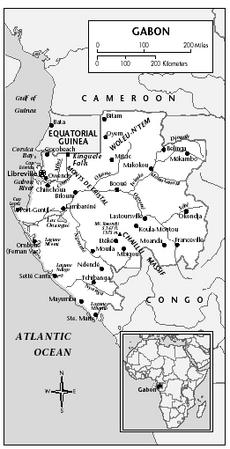Bantu peoples began to migrate to what is now Gabon from Cameroon and eastern Nigeria at least 2,000 years ago. The Portuguese sighted the coast as early as 1470 and gave Gabon its name because the shape of the Rio de Como estuary reminded them of a "gabao," a Portuguese hooded cloak. The Portuguese

founded permanent outposts, notably at the mouth of the Ogooué River, and their missionaries followed shortly. After the Portuguese, the region was visited by the English, Dutch, and French. During the 17th century, the great French trading companies entered the slave trade. French Jesuit missionaries were active along the coast during this period, and their influence eventually extended to the powerful native kingdoms inland.
The abolition of the slave trade by France in 1815 ruined many merchants but did not end French interest in the Gabon coast. French vessels were entrusted to prevent the illegal slave trade, and the search for new products for trade led to French occupation of the coastal ports. In 1839, the French concluded a treaty with Denis, the African king whose authority extended over the northern Gabon coast, by which the kingdom was ceded to France in return for French protection. A similar treaty gained France much of the southern coast below the Ogooué, and gradually other coastal chiefs accepted French control. The present capital, Libreville ("place of freedom"), was founded in 1849 by slaves who had been freed from a contraband slave runner.
French explorers gradually penetrated the interior after 1847. During 1855–59, Paul du Chaillu went up the Ogooué River, where he became the first European to see a live gorilla. He was followed by the Marquis de Compiègne, Alfred Marche, and other explorers, who mapped out its tributaries. Pierre Savorgnan de Brazza explored almost the entire course of the river during 1876–78. In 1880, he founded Franceville. In 1885, the Congress of Berlin recognized French rights over the right bank of the Congo, an area that Brazza had explored extensively. In 1890, Gabon formally became a part of French Congo. It was separated into a district administrative region in 1903 and in 1910 was organized as a separate colony, part of French Equatorial Africa. In 1940, Free French forces ousted the Vichy government from Gabon.
Léon Mba and Jean-Hilaire Aubame were the early leaders of the independence movement in Gabon, but their political inclinations were different. Mba led the Gabon Democratic Bloc; Aubame led the Gabonese branch of the Party of African Reunion. The latter actively sought the formation of federal, supranational groupings in Africa, whereas the former was strongly opposed to such associations. Underlying the attitude of Mba was the belief that Gabon, having the richest economic potential in the region, would end up supporting its poorer neighbors in any federal system.
In a referendum on 28 September 1958, the territory of Gabon voted to become an autonomous republic within the French Community. On 19 February 1959, a constitution was adopted, and a provisional government headed by Mba became the first official government of Gabon. Independence was formally proclaimed on 17 August 1960.
On 12 February 1961, Mba was elected president of the republic, heading a government of national union in which Aubame served as foreign minister. Friction continued between Mba and Aubame, however, and after several years of political maneuvering, Aubame led a successful coup d'état on 18 February 1964. Mba was reinstated on the very next day through French military intervention, as provided for by a treaty signed between the Mba government and the French in 1960.



No comments:
Post a Comment